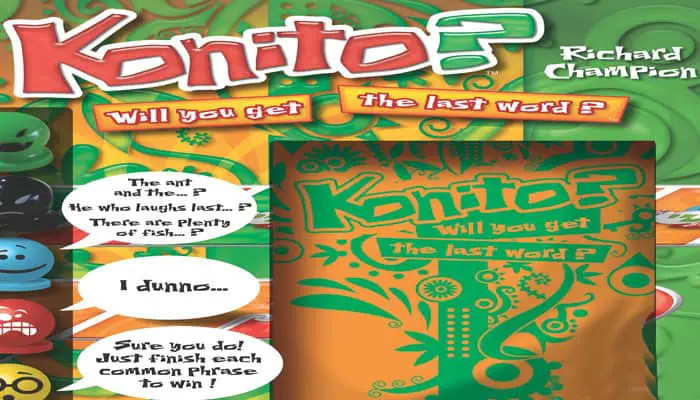
Larry, Moe, and... ? Don't Worry, Be. ? Crouching Tiger, Hidden. ?
If you answered, "Curly", "Happy", and "Dragon", well done! You just completed an easy Expression card, and can advance your pawn 1 space.
Finish all of the common expressions on a card face to move around the gameboard.
Easy, right?
Throw in a few Challenge cards to spice things up, and you get a game full of surprises! But don't take too long to answer, because the clock is?

Components
- 202 double-sided Expression cards
- 18 Challenge cards
- 5 pawns
- 1 sand timer
- 1 modular board
- 1 carrying bag
- Rulebook

Object of the Game
Get your team to guess the endings for common expressions, in order to advance your pawn and finish the race first.
Setup
Set up the gameboard however you wish (or just use the sample setup on the back of the box). The longer you make the path, the longer the game.
Change how many Challenges you face by choosing between the front or back of various pieces of the gameboard. The total number of spaces you choose can make the game last from 20 to 90 minutes.
Separate the Challenge cards from the Expression cards. Shuffle the Challenge cards to form a deck.
Then, separate Expression cards by color to form three decks (one per color). Shuffle each Expression deck, and place them next to the board.
Form 2 to 4 teams of players (for 4 or more players, it's usually best to make 2 teams).
Each team chooses a pawn and places it on the starting space (a green space).
The team with a player dressed in the lightest colors goes first.

Game Play
The first team chooses a reader from their team. Everyone else on the team is an answerer.
The reader draws a card whose color matches the space her team's pawn is on. Then she turns over the sand timer and reads the expressions (which were face-down) to her team. The rest of the team then tries to finish the expressions with her help.
Note: To get your team to guess the expression, you can do nearly anything. Read it aloud (of course), talk about it, make noises, sing, mime... anything!
Except, of course, say the missing words, related word forms, or rhymes of the words.
The reader can pass if her team gets stuck. But if she does, she must discard the current card and start with a new one.
The reader cannot pass until she has read at least the first expression to her team.

Expression Cards
Easy cards have a green background and 3 expressions.
Medium cards have an orange background and 4 expressions.
Difficult cards have a red background and 5 expressions.
As soon as a team completes all the expressions on a card face, the reader puts the card down and draws another card of the same color. Repeat until the timer runs out.
Note: Only entirely completed card faces count!
When the timer runs out, the team advances its pawn a number of spaces equal to the number of cards completed. Discard the cards. The team to the Left begins their turn.
Challenges
Challenges change the game. When a team starts its turn on a Challenge space, the reader draws a Challenge card and asks the team whether to read the first, second, or third challenge. Each challenge is shown in a color that indicates which color of Expression card you should use.
The reader reads the chosen challenge aloud. Once the team confirms that they understand the challenge, she turns over the timer and begins.
Playing with 2 or 3 Players
If you don't have enough players for teams, or if you prefer to be the lone victor, you can play individually. On your turn, choose an opponent to be your reader.
The reader can't do anything against the spirit of the game, but she can help you by singing, miming, etc. Your reader advances the same number of spaces you do, so choose wisely!

Challenges often make your team's turn harder, but grant an advantage, such as moving your opponents back or making your own pawn move faster. If a challenge disagrees with the rules, the challenge wins.
Challenges can involve the reader, the answerers, or opposing team members! (If the challenge says "you", it means the reader). Some challenges can also change the difficulty of the cards think fast!
Tip: Choose a player who is behind you or one on a green (easy) space, so she has to move to a more difficult space, or to a Challenge space. Use the situation to your advantage!
End of the Game
The first team to reach the final space wins. Good luck to all, and may the best?
Continue Reading

